- Radio & Podcasts
- Privacy Notice

Absolute Focus: Depeche Mode’s Music For the Masses Revisited Ned Raggett , September 11th, 2017 08:55
Our man in San Francisco, Ned Raggett was just unlucky enough to miss going to THAT Rose Bowl concert featured in the Depeche concert film 101. But he’s had thirty years to think about the featured album
Weirdly enough, it’s almost ignored.
Which is a very strange thing to say about an album called, however much in jest, Music For The Masses . You’d think that Depeche Mode’s sixth studio album in seven years might get a little more attention. But here’s an illustrative point: last decade, when the entirety of Depeche’s work over its first two decades was reissued with, among other things, bonus DVDs containing a multi-part documentary series, the one with Music only talked a little about said album. There’s some good anecdotes, don’t get me wrong, but the majority of it talked more about the tour and D. A. Pennebaker’s still-brilliant 101 concert film, not to mention the massive Rose Bowl show featured in said film. In comparison to the heavily detailed, intriguing documentary on Black Celebration , the album previous to Music , I remembered wishing there was something more.
Music isn’t a red-headed stepchild or anything in Depecheworld, don’t get me wrong there. We are talking about the album with two of its most defining songs on it - the monstrous ‘Never Let Me Down Again' and the propulsive ‘Behind The Wheel,' about which plenty more to say later. But from a distance it almost feels a bit lost in the shadows of two crystallisations of the evolving story of the band. There was 1986’s Black Celebration , the clear pivot and shift from an often more frenetic/industrial-electronic approach to something starting to hint at arena-rock aesthetics. It had a looming, brooding darkness on multiple levels but was still, for any number of listeners and bands that followed in its wake, a high water mark across the board. Then, of course, Violator in 1990, almost talked into the ground at this point but undeniably the moment where after a decade of building things up Depeche vaulted into the realms that they’ve never quite left since, smash hits worldwide, a knack for hooks perfected, an electronic/rock fusion that was also the beginning of the full turn towards being a true electronic rock band, albeit without a bassist.
Caught between the two, and sharing the light with 101 , Music For The Masses isn’t a small album, nor is it a weak one. From an increasing distance, though, it feels underrated - which may be a surprise to anyone in the crowd shown in 101 , listening to Los Angeles’s powerhouse station KROQ spinning songs from it constantly, attending that Rose Bowl show. I didn’t go myself - 1988 was the year I fully got into the band, and living some hours away I hadn’t put it together to see about going to the show until it was too late - but when I started at UCLA later that year, it seemed like everyone in my dorm who was local to the area had been to the show and had bought approximately eight million T-shirts. Each. Depeche wasn’t the only major musical force in the inescapable air at that time and place - add on Guns N' Roses getting a lot of attention, not to mention NWA and Jane’s Addiction hot on their heels. But all those bands were local, among many others; Depeche, though...they were that big and that unifying, from thousands of miles away.
Depeche as a unit came into Music on a roll, Black Celebration having started to really cement a subcultural impact in America beyond early pockets of fandom and the fluke top 40 success of ‘People Are People.' They’d also just started filming videos with Anton Corbijn, who immediately took the band well beyond both their goofily dorky start in that field as well as the often too earnestly clunky examples from the mid-80s. It was just enough of an experimental/European art film aesthetic at work to stand out from a lot of the crowd then, both in ‘modern rock’ or however the term was used and in MTV’s wide reach as a whole. Finally, in a sharp move, they’d taken note of another breakout American success story: Tears for Fears, whose Songs From The Big Chair had dominated almost everywhere in 1985 and 1986. Dave Bascombe, whose engineering work on those sessions emphasised the big, sweeping and pounding, was recruited as producer, taking over from early stalwart Gareth Jones; for the first time Mute label head Daniel Miller didn’t feel he needed to be there to help on coproduction.
‘Strangelove' slipped out as an early single while sessions were still ongoing; as first heard it was aggressive synth-funk that was almost...sprightly. Which both worked and didn’t, as later versions of the song would demonstrate over the next eighteen months. Still, it helped set the overall tone of things to come, with the Corbijn video fully showcasing the director’s eye for odd, intriguing visuals shot through with humour and barely concealed lust, while the sleeve provided the first hint of the Martyn Atkins-created visual hook for the album: a closeup of a red megaphone, with the slightly unexpected logo of ‘BONG 13.' But when ‘Never Let Me Down Again' was released as the next single shortly before the album’s full release, the sense of what Depeche and company could really do, and where they were at, was now absolutely set.
Black Celebration had admittedly already started to set particular tones in this front, and similarly its leadoff single, ‘Stripped,' was a clear declaration of intent, emphasising growling machinery, a sense of vast space, explosions and emotion. It was arguably them vaulting up to the bigger venues they’d play on that tour. So maybe ‘Never Let Me Down Again' acts as the signal in advance that yes, they COULD play the Rose Bowl - and they of course did, and the scene where, during a performance of said song, Dave Gahan, isolated in a spotlight, demonstrates the now-expected back-and-forth arm wave, only for the lights to go up to show thousands of people in the stands doing just that, remains one of those moments that’s amazing, chilling and compelling all at once. In the commentary for the DVD release of the film, Gahan marvels about that and the song itself, saying that its overwhelming arrangement feels almost like Wagner, and he’s not wrong, really. (More on Wagnerian associations at the end, though.)
The impact, though, almost obscures the obsessive detail in the song - like the best of such constructions, more emerges each time you give it a relisten. This isn’t even referring some of the best remixes of it from the time as well, adding new moments of awe. Arguably the lyrical scenario is simply ‘Waiting For The Man' by the Velvet Underground twenty years on and depersonalised, hidden in language that suggests rather than spells out - the narrative voice isn’t interested in the details of who provides the fix and where to go, it’s all about the experience, and even that could be seen strictly in the realm of twisted romance. Martin Gore’s lyric does also provide what for a lot of people has been a big lyrical stick to beat him and the band with since - the rhyme of ‘houses’ and ‘trousers’ - but me, I kinda love it. Gore’s gift for the big blunt hook means just that, and you have to buy into all of it for it to work.
If it was just that, though, it could simply be a rumination on surrender and control. ‘Never Let Me Down Again' doesn’t ruminate, though, it dominates. From the start - the rising guitar hook provides something quick and seemingly quiet, but then the first beat kicks in and pretty much it’s almost all over from the start: the hook disappears and recurs, synth and piano melodies pound out, distant slow bass parts provide a murky undertow, Gahan sounds almost innocent and happy as much as he sounds desperate. Yet for all the obsessive focus the song presents, it also provides variety. By the second verse, there's a new rhythm pattern that subtly kicks in over the main one, a gently raspy overlay; Gore’s backing vocal steps in and out of the background behind Gahan, appearing in full at the end with the sing-song romance-as-delusion “See the stars, they’re shining bright/Everything’s all right tonight.” When those buried orchestral swells and weird wordless cries - if they are that - first appear at the end, the whole thing becomes a tight loop/effect that is as much grandeur in sound as anything Phil Spector did at his most opulent.
Meanwhile, while I wouldn’t go so far as to call it a concept at work, it’s a little telling that the other major single from the album played out the sense of going for a ride with someone that’s calling the shots, only in a much more literal car-related sense. As with ‘Never Let Me Down Again,' ‘Behind The Wheel' is fairly obviously so much metaphor as any number of car-related songs in 20th century pop history has been. If the Smiths’s then-year-old ‘There Is a Light That Never Goes Out' was more directly about a particular scenario and desperation - “take me anywhere, I don’t care!” counterbalanced with a “strange fear” - ‘Behind The Wheel' was well beyond that fear stage. The desperation may have been there in the “I’ll do anything...please!” but it was all said-as-much-as-sung with a purring, knowing confidence from Gahan, that instead of having to convince someone of something, two people knew exactly where they need to be right at that moment.
It was also a real sign of the musical moment as well that a rattling hubcap in perfect stereo could serve as an opening hook. I don't know how many times I heard ‘Behind The Wheel' when I got that single but it was also the first Depeche single I did ever get and I think I warped the vinyl after all the plays. Motorik-as-disco-as-techno-as-involved overlay of about three or four different synth melodies and loops and also this basic as hell guitar part which, it turned out, was all that was needed. In an era where the Sunset Strip shredder stereotype was fully in gear thanks to the impact of Eddie van Halen in particular, it's like Gore loved playing anti-solos - why make a mess when you could have absolute focus? The whole song works on the principle of interlocking parts, a construction at full function, a tension that never truly resolves: flamenco handclaps as martial beats, gear shifts as machines exhaling, more synths as a queasy orchestration, vocal snippets brutally cut into a loop. And even one actual car part in stereo. To make a comparison to a Depeche hero: ‘The Passenger' was about watching everything and thinking it looked good, but Iggy Pop was still in control. As a whole ‘Behind The Wheel' is about losing control and loving every goddamn minute of it, surrender to the other and the arrangement.
As for ‘Strangelove,' the album version beats out the earlier single version to the moon and back. Whether it was about taking a little more time to play around with the arrangement or just the space that an album approach allowed - and maybe it was just about sequencing too - it’s a much different beast here. On an album where strong, unique song beginnings are key, it’s another success, starting with a quiet machine gear loop noise, almost like a more abstract version of the engine chug that underscores ‘Stripped,' along with a barely audible bell-like synth part. Then the already familiar triple-pound BAM BAM BAM from the single version arrives and suddenly it pulls back once more, but into something else: bass and beats that in its brute simplicity could be, say, Prince on tour 1984 in eastern Europe, if that had been allowed back then. Or maybe call it Motown 1971 after the apocalypse when the robots took over.
The song essentially breathes more, so when the full hooks begin everything has felt like it’s built up to a moment rather than being slammed directly into it. No problem with the latter approach, of course, but as both ‘Never Let Me Down Again' and ‘Behind The Wheel' had demonstrated, there’s something to be said for the monumentalism to grow a bit rather than completely crash onto a listener. Gore’s guitar on this one is subtle compared to those songs, but like on so many later compositions it's this lovely shading, hiding out amid the strident synth riff that's this unmissable nag nag nag. I like how at the end there's a part where Gahan calls and responds to himself and then suddenly, based on where his voice 'should' be per what’s already been performed, a sudden high synth bit squirrels across the mix. It’s that sense of things being just off-kilter - or just human - enough that helps Music throughout.
What makes Music For The Masses hold together as an album, though, isn’t just those singles, strong as they are. It’s also the still-in-sync band dynamic of the period, with Alan Wilder’s ear for not only his own performances but the possibilities in terms of sound and arrangement coming ever more to the fore. The reissue documentary helps spell this out further, with both Wilder and Bascombe happily talking about their experimenting with creating new sounds, from instruments and from other sources, and Gahan’s effusive praise for Wilder’s abilities all around. Combine that with Black Celebration ’s having clearly shown - especially on its second side - how fragmentary, shorter or more cryptic and understated songs were as much something in the general Depeche toolbox as a chartbound stomp, and Music was in ways the slightly more polished version of that approach, just. Not quite as much, granted, and some songs here are more enjoyable rather than distinct - ‘Nothing' in particular almost could be a throwaway, suggesting a Depeche from two years back sonically, even if Gahan’s vocals showed it wasn’t that entirely.
But there’s plenty of instances of “what if we do this - wait this is brilliant!” happening almost song for song. Consider how the there-is-no-subtext-here ‘I Want You Now' invents Timbaland’s approach about a decade before he helped rewrite pop. Okay, a bit extreme, but then again: for a while there, he often got reactions, understandable ones too, along the lines of "Wow, a drawn breath as a rhythm and a sample on an r&b and pop hit!" ‘I Want You Now’ has several hums and gasps - male and female, sampled, per the previously mentioned documentary, from a very naughty film, shall we say - interwoven around each other, around accordion as well, Gore’s vocals rising through the minimal synth line, sudden dramatic silences, a random unsettling burst of laughter, a siren loop, wordless keening overdubs. To say it’s all very filthy is a compliment, to say it’s a great song to sing along to even more of one. There’s also, from start to stop, a steady wheezing back and forth that sounds even more like someone in a kind of extremis of the pleasurable kind. Turns out this was that previously mentioned accordion - only in this case, modified so instead of the familiar sound of the instrument it’s simply the air moving in and out of it, recorded and looped.
Then there’s ‘Little 15,' a song whose lyrical meaning I still haven’t been able to exactly figure out after thirty years - cryptic romance? transposed wish fulfilment? - but musically, per Wilder’s comments, it takes inspiration from Michael Nyman’s score for Peter Greenaway’s A Zed And Two Noughts . There weren’t many bands trying to do that then or now, much less an emerging superstar act, and taking that idea where it might go. For starters, what the hell IS the opening loop on the song? Strings and music box? Speaking for myself, it's all about the first time that the string part appears in full, and then how that descending piano line heralds this quiet second melody which in turn heralds the from-the-mountaintop drums and then this break that's suddenly pure cinematic romantic elegant gloom, like the train broke down in the Alps or the Carpathians and the Russian winter is about to take over the land and everyone is resigned to their fate. By the end of the song everything's about as detailed as a Bomb Squad mix, not that most people would ever admit to that. And this is a ballad!
There’s more to be said about pretty much all the other songs in turn, how they often bleed into one another rather than existing discretely, helping to create a mood or maintain it - or even subvert it, as with ‘The Things You Said,' a complete turnaround from the immediately preceding ‘Never Let Me Down Again.' A Gore-sung ballad with a long whisper/sigh leading into a low, quietly relentless bassline, distant star-twinkle melodies, murky backwards-run instrumental moments, emotional brinksmanship, a last isolated overdubbed "They know me better than that..." - it’s anything but a simple song in its careful layering. Later there’s ‘To Have And To Hold,' in ways the logical extension of Some Great Reward ’s blackly cynical cover photo, only here perhaps positing some sort of relationship, marriage or otherwise, as an anchor and a way out of hell. Except it sounds like a long slow slide into hell from the start, not a traditional pop song as such, it has no chorus, it's just one verse, one slow, spiralling downward, grinding, dark, monumental, dour, desperate crawl out of the pit because it's all over verse. Piano lines sneak around Gahan’s vocals, quiet counterpoints slide beneath them. When the Deftones ended up covering Depeche for a tribute album, this is the song they chose - and that immediately earned my respect. You have be a stone-cold fan to know this one, and to love it.
Finally, meanwhile, there’s the instrumental song that ends the album but was also the original B-side to ‘Strangelove.' Logically, therefore, this song is based around a piano part that's attractive as well as a little ominous, that slowly and carefully adds on barely audible bells and a stentorian three note/beat bass/drum/more piano 'begin the pagan fires for the blood ceremony!' rhythm and then high and slightly tortured sounding strings and a contrasting low/high/low/high near-wordless vocal exercise and then MORE bells sounding like the chimes of doom and cymbal splashes and then Valkyries keening on high and then demented church organ loops and the sense that perhaps Gotterdammerung might actually be heralded by some dudes from Basildon and then there's an echoing stop. The fact that it’s called ‘Pimpf' - a German language term for male youth that was eventually used to refer the youngest cohort of the Hitler Youth organization - almost seems to explain itself. But given recent history - including Gahan’s inspirational verbal trashing this year of neo-Nazi/alt-right type Richard Spencer, who had claimed Depeche was the representative band of his ‘movement’ - you can sense from a distance how what must have been more of an ironic, perhaps too glib, reference on an album shot through with monumentalism evoking a particular style and appearance takes on unavoidable shades.
Still, the conscious idea of performative interpretation of arena rock as fascist rally had long been kicking around already at that point - just ask Roger Waters for a start - and I tend to think of ‘Pimpf' as less of extended melodrama and black joke as I do of it as it functions in 101 , both film and the accompanying live album, where it was the band’s intro music for the tour, never performed live but always one heck of a way to rabble rouse. And in the film, I just think of the band making their way out to the main stage, Gahan with a drink in hand, all of them looking a little tired and maybe a bit nervous, their big bet that they could do the Rose Bowl actually happening, thousands upon thousands upon thousands of people waiting to sing along to every word. As I’ve marvelled at more than once, this era, and that show and that film, underscore something important: Violator may have finally cemented Depeche Mode’s place as a unique act, a fusion and extension of multiple impulses that created a new sonic blueprint for many more to follow, but the band that recorded Music For The Masses and took it on tour, and the fans who listened and followed them, none of them knew Violator or Songs Of Faith And Devotion or everything else that was to come would happen the way it did. Depeche were already that, indeed, massive, building and bursting out to the world on its own terms. Violator underscored it - Music For The Masses proved it.
One last note on the album: following ‘Pimpf'’s dramatic conclusion and a pause of a few seconds, there’s a final snippet of clinked bottles and a door closing and feet walking over a bit of mournful strings once again caught in a loop that appears after a few seconds. Who needs a high tone only dogs can hear to end a record?
SUBSCRIBE TO THE QUIETUS
If you love what we do, you can help tQ to continue bringing you the best in cultural criticism and new music by joining one of our subscription tiers. As well as the unparalleled joy of keeping the publication alive, you'll receive benefits including exclusive editorial, podcasts, and specially-commissioned music by some of our favourite artists. To find out more, click here.
SEARCH THE QUIETUS
Related articles.
- Erasure & Kate Bush: The Lost Collaboration »
- Vince Clarke Interview: Erasure, Depeche Mode Reuniting and Yazoo »
- We Welcome Spring With A Seasonal Spotify Playlist »
- Depeche Mode - Sounds Of The Universe. The First Review Of New Album »
- David Stubbs Explores The Battle Between Thatcherite Pop And Marxist Funk »
MORE FROM NED RAGGETT
- Driving Force: Adam Franklin's Baker's Dozen »
- A Balancing Act: Depeche Mode's Construction Time Again At 40 »
- New Pathways: Takiaya Reed Of Divide & Dissolve's Baker's Dozen »
- Reissue Of The Week: Movietone by Movietone »
- Close To Him: Tom Sheehan’s Pictures Of The Cure »
MORE: ANNIVERSARY
- Long Game: Ghostface Killah's The Pretty Toney Album 20 Years On »
- An Explosion Of Feelings: Soft Cell’s This Last Night In Sodom »
- Dead Dogs & Beauty: cLOUDDEAD's Ten At 20 »
- Lightning Ahead: Underworld's Dubnobass- withmyheadman At 30 »
- Down To You: Joni Mitchell’s Court And Spark At 50 »
Support tQ's work by becoming a subscriber and enjoy the benefits of bonus essays, podcasts and exclusively-commissioned new music. To find out more, click here.
- North of Purgatory: A Coma Diary »
- One for the Road »
- The Rumour Mill »
- It Started With A Mix »
- Escape Velocity »
- In Extremis »
- Quietus Artists Of 2008 »
- Remember Them... »
- Things I Have Learned »
- Rock's Backpages »
- A Quietus Interview »
- In Their Own Words »
- The Spotify Playlist »
- Sonic Router »
- Dragnet »
- In Conversation »
- Autobahn »
- Dr Rock »
- Columnus Metallicus »
- A Domino Halloween »
- Beyond The Hits »
- Quietus Artists Of 2009 »
- Anniversary »
- Fall Sound »
- Noel's Straight Hedge »
- 2010 A Glass Half Full »
- Quietus Artists Of 2010 »
- Baker's Dozen »
- Rockfort »
- Ten Songs »
- An Eastern Spring »
- Rum Music »
- Quietus Mixes & Radio »
- Hyperspecific »
- A New Nineties »
- Quietus Artists Of 2011 »
- Strange World Of... »
- The Long Lunch »
- Afrosonic »
- John Peel's Records »
- Hoody Who »
- The Calvert Report »
- Radio-Activity »
- Tape Adapter »
- I Am Demo Suzuki »
- Electro Chaabi »
- Track-By-Track »
- Complete Communion »
- Spool's Out »
- Radio »
- One Take »
- Quietus Charts »
- At Leisure »
- Junk Shop Classical »
- Album Of The Week »
- Reissue Of The Week »
- Subscriber Area »
- New Weird Britain »
- Columnfortably Numb »
- Live Reviews »
- Television »
- Art »
- Books »
- Black Sky Thinking »
- In Defence Of... »
- Mr Agreeable »
- I'm No Expert... »
- Dr Johnson »
- 2009 Wreath Lectures »
- Come On Fry Young »
- John Moore's Diary »
- 2010 Wreath Lectures »
- You Heard Me Wrong »
- Wreath Lectures »
- The Quietus Essay »
It looks like you're using an adblocker.
As a wholly independent publication, we rely entirely on our ad bookings to keep The Quietus going. Please whitelist our site in order to continue to access The Quietus.
Music for the Masses
- View history
- 1 Background
- 4.1 Standard Version
- 4.2 2006 re-release/Deluxe Version
- 5 Critical reception
- 7 Re-release
- 8 Personnel
- 9.1 Weekly charts
- 9.2 Year-end charts
- 10 Certifications
Background [ ]
Daniel Miller, who had co-produced Depeche Mode 's previous album, voluntarily stepped away from production duties for this album, citing the growing tension in the studio that they had experienced during the recording of Black Celebration . With Miller's approval, the band co-produced the album with David Bascombe, who had previously worked as a recording engineer with Tears for Fears and Peter Gabriel.
Band members Andy Fletcher and Martin Gore both explained the album's title was conceived as a joke. Fletcher said, "The title's ... a bit tongue-in-cheek, really. Everyone is telling us we should make more commercial music, so that's the reason we chose that title." According to Gore , the title "was a joke on the uncommercially of [the album]. It was anything but music for the masses!"
Artwork [ ]
The megaphone (or its iconic representation) on the album's cover was used during the breadth of the album's release: at press events, on the covers of the album's singles, and during the tour. Alan Wilder gave credit to Martyn Atkins, who had been a longtime Depeche Mode collaborator, for the use of the megaphone. "[Martyn came] up with this idea of a speaker, but, to give the kind of ironic element which the title has, to put this speaker in a setting which wasn't really to do with the masses at all. It was, in fact, the opposite. So you end up with this kind of eerie thing where you get these speakers or megaphones in the middle of a setting that doesn't suit it at all, like a desert or whatever." The deserted natural setting in question was the Peak District.
An early alternative cover was rejected for the album. The rejected cover was also designed by Atkins and a test pressing copy was auctioned off by Wilder in 2011. It features a white-and-orange stylized design of the megaphone emitting sound waves.
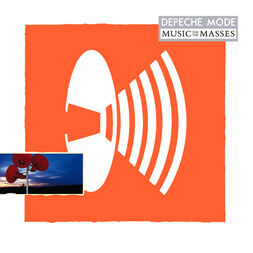
Alternative cover for the album.
Singles [ ]
- Strangelove , released on April 13, 1987
- Never Let Me Down Again , released on August 24, 1987
- Behind The Wheel , released on December 28, 1987
- Little 15 , released on May 16, 1988
Track listing [ ]
Standard version [ ].
Bonus tracks on 1987 CD and cassette releases
- On the CD, there is a 20-second pause in between " Pimpf " and "Interlude #1", followed by a 30-second pause in between "Interlude #1" and "Agent Orange".
- On some copies of the cassette the album is presented on side 1 with the four bonus tracks comprising the entirety of side 2.
2006 re-release/Deluxe Version [ ]
- Disc one is a hybrid SACD/CD with a multi-channel SACD layer.
- Disc two is a DVD containing Music for the Masses in DTS 5.1, Dolby Digital 5.1 and PCM Stereo plus bonus material
Music for the Masses (DTS 5.1, Dolby Digital 5.1 and PCM Stereo)
- Depeche Mode 87–88 (Sometimes You Do Need Some New Jokes)"
Bonus 5.1 audio mixes (DTS 5.1, Dolby Digital 5.1 and PCM Stereo)
Bonus tracks (in PCM Stereo)
Critical reception [ ]
The album mostly received favorable reviews upon release. Robert Christgau complimented the abnormal road symbolism of the lyrics, particularly on "Little 15", and believed that apart from the sadomasochistic metaphors, Depeche Mode succeeded in turning "adolescent Weltschmerz into something catchy, sexy and seemingly significant". NME 's Jane Solanas felt Gore was "at his obsessive best" on Music for the Masses , particularly on "Never Let Me Down Again", which she called "an intriguing masterpiece, combining homo-eroticism with drug euphoria." In a less enthusiastic review, Paul Mathur from Melody Maker was ambivalent towards the group's more mature, minimalist aesthetic and said although they had departed from their simpler pop sound, the record was "seamless, fluid, and, once the lights are out, particularly dull."
In a retrospective review, Q magazine found the narratives on Music for the Masses to be among Depeche Mode's most uncertain and contemplative, and that most of its songs were "real diamonds in the darkness ... this was the point at which Depeche Mode were first taken seriously." Slant Magazine 's Sal Cinquemani said that Music for the Masses showed the gloomier side of the "post-punk synthpop" scene during the 1980s and was a success with both critics and consumers. Alternative Press called the record "articulate, intricate electronic music that lacked the tinny feel of DM's early synth pop". Music for the Masses was listed by Slant Magazine at number 75 on their list of "Best Albums of the 1980s".
The album was supported by the Music for the Masses Tour . It started on October 22, 1987 and ended on June 18, 1988.
Re-release [ ]
In 2006, Music for the Masses became one of the first Depeche Mode albums (along with Speak & Spell and Violator ) to be released on a special two-disc SACD/CD Hybrid + DVD format, in the vein of their 2005 album Playing the Angel , which had a limited edition SACD + DVD release. The format was the same as Playing the Angel 's, the first disc had a special digitally remastered version of the album, while the DVD had the album on three formats (PCM Stereo, 5.1 surround sound and DTS 5.1) plus bonus tracks, and a documentary on the album. The re-release preserves the album as it was originally intended. Thus, the four bonus tracks do not appear on the SACD, but appear on the DVD. The DVD also features all B-sides from the Music for the Masses era, but unlike the album and the bonus tracks, the B-sides are only available in PCM Stereo.
The documentary, a 37-minute short film titled Depeche Mode: 1987–88 (Sometimes You Do Need Some New Jokes) , is an extensive look at the album, featuring commentary from a wide variety of people, including the current Depeche Mode, former member Wilder, producer David Bascombe, Daniel Miller, Daryl Bamonte, Atkins (who came up with the loudspeakers idea for the cover), Anton Corbijn, and others. The documentary features new facts on the album, and also an extensive look at the film 101 .
The re-release was released on 3 April 2006 in Europe. The U.S. version was delayed to June 2, 2006 and is only available on a CD + DVD format, with no SACD. The DVD on all the versions are region independent however, so one can simply import the SACD version without worrying about the DVD being incompatible. The remastered album was released on vinyl on March 2, 2007 in Germany and March 5, 2007 internationally.
Personnel [ ]
Credits adapted from the liner notes of Music for the Masses .
Depeche Mode
- Andrew Fletcher
- Martin Gore
- Alan Wilder
- David Gahan
- Depeche Mode – production
- David Bascombe – production, engineering
- Daniel Miller – additional production, help
- Martyn Atkins – design, photography
- David Jones – design, photography
- Mark Higenbottam – design, photography
Weekly charts [ ]
Year-end charts [ ], certifications [ ].
Certifications for Music for the Masses
Sources [ ]
- https://en.wikipedia.org/wiki/Music_for_the_Masses
- https://dmlive.wiki/wiki/Music_For_The_Masses
- 1 Martin Gore
- 2 Dave Gahan
- 3 Depeche Mode
To discuss Depeche Mode with other fans, please consider joining the official Depeche Mode Discord server or independent fan server Discord for the Masses . To coordinate site work, we recommend the Depeche Mode Live Editor Discord group .
Category : 1987-1988 Music For The Masses Tour
The Music For The Masses Tour was a 1987-1988 international tour undertaken by Depeche Mode in support of their sixth studio album Music For The Masses .
- 1 Line up and songwriting credits
- 2 Dates with downloads available
- 3 Dates without available downloads
- 4 Recommended recordings
- 5 References
Line up and songwriting credits
- Dave Gahan - lead vocals
- Martin L. Gore - keyboards, guitar, backing vocals, percussion pads, melodica (during Everything Counts ) [1] , occasional lead vocals (denoted by (*) in track listings)
- Andrew Fletcher - keyboards, percussion pads
- Alan Wilder - keyboards, backing vocals, percussion pads
All songs performed were written by Martin L. Gore, except for Just Can't Get Enough which was written by Vince Clarke and Never Turn Your Back On Mother Earth which was written by Ron Mael.
Dates with downloads available
- 1987-10-22 Pabellon De Real Madrid, Madrid, Spain
- 1987-10-23 Blaugrana Sports Palas, Barcelona, Spain
- 1987-10-25 Olympiahalle, Munich, Germany
- 1987-10-26 Palasport, Bologna, Italy
- 1987-10-27 Paleur, Rome, Italy
- 1987-10-29 Palasport, Turin, Italy
- 1987-10-30 Palatrussardi, Milan, Italy
- 1987-11-02 Hanns-Martin-Schleyer-Halle, Stuttgart, Germany
- 1987-11-03 Festhalle, Frankfurt, Germany
- 1987-11-04 Grugahalle, Essen, Germany
- 1987-11-06 Sporthalle, Cologne, Germany
- 1987-11-07 Messehalle, Hannover, Germany
- 1987-11-09 Deutschlandhalle, Berlin, Germany
- 1987-11-11 Friedrich-Ebert-Halle, Ludwigshafen, Germany
- 1987-11-12 Hallenstadion, Zurich, Switzerland
- 1987-11-13 Halle des Fêtes, Lausanne, Switzerland
- 1987-11-16 Palais Omnisports de Paris-Bercy, Paris, France
- 1987-11-17 Palais Omnisports de Paris-Bercy, Paris, France
- 1987-11-18 Palais Omnisports de Paris-Bercy, Paris, France
- 1987-12-04 The Forum, Inglewood, CA, USA
- 1987-12-12 UIC Pavilion, Chicago, IL, USA
- 1987-12-15 The Forum, Montreal, QC, Canada
- 1987-12-18 Madison Square Garden, New York, NY, USA
- 1988-01-09 Newport Centre, Newport, Wales, UK
- 1988-01-11 Wembley Arena, London, England, UK
- 1988-01-12 Wembley Arena, London, England, UK
- 1988-01-15 N.E.C., Birmingham, England, UK
- 1988-01-16 Icerink, Whitley Bay, England, UK
- 1988-01-17 Playhouse Theatre, Edinburgh, Scotland, UK
- 1988-01-19 G-MEX Centre, Manchester, England, UK
- 1988-01-20 Sheffield City Hall, Sheffield, England, UK
- 1988-01-21 St. George's Hall, Bradford, England, UK
- 1988-01-23 B.I.C., Bournemouth, England, UK
- 1988-01-24 Centre, Brighton, England, UK
- 1988-02-06 Alsterdorfer Sporthalle, Hamburg, Germany
- 1988-02-07 Alsterdorfer Sporthalle, Hamburg, Germany
- 1988-02-09 Westfalenhalle, Dortmund, Germany
- 1988-02-10 Weser-Ems-Halle, Oldenburg, Germany
- 1988-02-12 Johanneshov Isstadion, Stockholm, Sweden
- 1988-02-13 Scandinavium, Gothenburg, Sweden
- 1988-02-15 Drammenshallen, Drammen, Norway
- 1988-02-17 Valbyhallen, Copenhagen, Denmark
- 1988-02-18 Valbyhallen, Copenhagen, Denmark
- 1988-02-19 Ostseehalle, Kiel, Germany
- 1988-02-21 Forest National, Brussels, Belgium
- 1988-02-23 Espace Foire, Lille, France
- 1988-02-26 La Beaujoire, Nantes, France
- 1988-02-27 Patinoire, Bordeaux, France
- 1988-02-29 Palais des Sports, Toulouse, France
- 1988-03-01 Le Zenith, Montpellier, France
- 1988-03-02 Palais des Sports, Lyon, France
- 1988-03-05 Hall Rhenus, Strasbourg, France
- 1988-03-07 Werner-Seelenbinder-Halle, East-Berlin, East-Germany
- 1988-03-09 Sportcsarnok, Budapest, Hungary
- 1988-03-10 Sportcsarnok, Budapest, Hungary
- 1988-03-11 Sportovni Hala, Prague, Czech Republic
- 1988-03-13 Stadthalle, Vienna, Austria
- 1988-04-18 Festival Hall, Osaka, Japan
- 1988-04-19 Koseinenkin Hall, Nagoya, Japan
- 1988-04-21 NHK Hall, Tokyo, Japan
- 1988-04-22 NHK Hall, Tokyo, Japan
- 1988-04-29 Shoreline Amphitheatre, Mountainview, CA, USA
- 1988-04-30 Cal Expo Amphitheatre, Sacramento, CA, USA
- 1988-05-04 P.N.E. Coliseum, Vancouver, BC, Canada
- 1988-05-08 Salt Palace, Salt Lake City, UT, USA
- 1988-05-09 McNichols Sports Arena, Denver, CO, USA
- 1988-05-18 Northrop Auditorium, Minneapolis, MN, USA
- 1988-05-20 Poplar Creek Music Fest, Chicago, IL, USA
- 1988-06-01 Meadowlands Arena, East Rutherford, NJ, USA
Additionally, a nearly-complete good sounding audience recording of support act Orchestral Manoeuvres In The Dark from the '101' Rose Bowl concert is available to stream and download here.
Dates without available downloads
- 1987-12-01 Cow Palace, San Francisco, CA, USA
- 1987-12-05 The Forum, Inglewood, CA, USA
- 1987-12-07 Sports Arena, San Diego, CA, USA
- 1987-12-08 Compton Terrace, Phoenix, AZ, USA
- 1987-12-10 Reunion Arena, Dallas, TX, USA
- 1987-12-14 Maple Leaf Gardens, Toronto, ON, Canada
- 1987-12-17 Patriot Center, Fairfax, VA, USA
- 1988-02-25 Parc De Penfeld, Brest, France
- 1988-03-04 Palais Des Sports, Besancon, France
- 1988-05-02 Coliseum, Seattle, WA, USA
- 1988-05-05 Civic Auditorium, Portland, OR, USA
- 1988-05-06 Civic Auditorium, Portland, OR, USA
- 1988-05-11 Frank Erwin Center, Austin, TX, USA
- 1988-05-13 Six Flags Over Texas, Arlington, TX, USA
- 1988-05-14 Southern Star Amphitheater, Houston, TX, USA
- 1988-05-15 Lakefront Arena, New Orleans, LA, USA
- 1988-05-17 Five Seasons Center, Cedar Rapids, IA, USA
- 1988-05-21 Pine Knob Music Theatre, Clarkston, MI, USA
- 1988-05-22 Riverbend Music Center, Cincinnati, OH, USA
- 1988-05-24 Starwood Amphitheatre, Nashville, TN, USA
- 1988-05-25 Southern Star Amphitheatre, Atlanta, GA, USA
- 1988-05-27 The Spectrum, Philadelphia, PA, USA
- 1988-05-28 Merriweather Post Pavilion, Columbia, MD, USA
- 1988-05-30 Blossom Music Festival, Cleveland, OH, USA
- 1988-06-03 Jones Beach Theater, Wantagh, NY, USA
- 1988-06-04 Jones Beach Theater, Wantagh, NY, USA
- 1988-06-07 Great Woods Amphitheater, Mansfield, MA, USA
- 1988-06-08 The Forum, Montreal, QC, Canada
- 1988-06-09 CNE Grandstand, Toronto, ON, Canada
- 1988-06-11 AJ Palumbo Center, Pittsburgh, PA, USA
- 1988-06-15 Compton Terrace, Phoenix, AZ, USA
- 1988-06-18 Rose Bowl, Pasadena, CA, USA
Recommended recordings
These recordings are highly recommended as they are generally regarded as some of the best recordings from this tour. This is not an exhaustive list of very good sounding recordings.
- 1987-10-23 Blaugrana Sports Palas, Barcelona, Spain (Audience)
- 1987-11-06 Sporthalle, Cologne, Germany (Audience)
- 1988-01-11 Wembley Arena, London, England, UK (Audience)
- 1988-04-29 Shoreline Amphitheatre, Mountainview, CA, USA (Audience)
- 1988-05-18 Northrop Auditorium, Minneapolis, MN, USA (Audience)
- ↑ Source: Shunt Q&A, LIVE - live albums / versions / performance, second page ; about 1/3rd down the page, Alan Wilder confirms it was a melodica
Pages in category "1987-1988 Music For The Masses Tour"
The following 101 pages are in this category, out of 101 total.
- 1988-01-21 St. George's Hall, Bradford, England, UK

Depeche Mode tours
- Pages using DynamicPageList3 parser tag
- Pages using DynamicPageList3 parser function
Navigation menu
Page actions.
- View source
Personal tools
- Request account
- DM Live home page
- Recent changes
- Random page
How to contribute
- Converting and burning files
- Contributing recordings, tickets, set lists
- Manual of style
- Pages needing attention
- 1982 See You Tour
- 1982-1983 A Broken Frame Tour
- 1983-1984 Construction Time Again Tour
- 1984-1985 Some Great Reward Tour
- 1986 Black Celebration Tour
- 1987-1988 Music For The Masses Tour
- 1990 World Violation Tour
- 1993 Devotional Tour
- 1994 Exotic Tour
- 1997 Ultra Parties
- 1998 The Singles 86>98 Tour
- 2001 Exciter Tour
- 2005-2006 Touring The Angel
- 2009-2010 Tour Of The Universe
- 2013-2014 Delta Machine Tour
- 2017-2018 Global Spirit Tour
- 2023-2024 Memento Mori Tour
- Miscellaneous performances
Dave Gahan solo tours
- 2003 Paper Monsters Tour
- 2015 Angels and Ghosts Tour (Dave Gahan & Soulsavers)
- 2021 Imposter Tour (Dave Gahan & Soulsavers)
Recoil tours
- 2010-2011 Selected Events Tour
Martin L. Gore solo tours
- 2003 A Night With Martin L. Gore
- Andrew Fletcher DJ sets
- Martin L. Gore DJ sets
- Recoil DJ sets
- Daniel Miller DJ sets
Information
- Early live-only songs
- 1980/1981 background info
- Depeche Mode sample sources
- Recoil sample sources
- Tour diaries
- Depeche Mode Information Service newsletters
- BONG magazine scans
- Ticket stub scans
- Set list sheet pictures
- Support acts
- DM-related bands
- What links here
- Related changes
- Special pages
- Printable version
- Permanent link
- Page information
- This page was last edited on 2 July 2023, at 13:41.
- Privacy policy
- About Depeche Mode Live Wiki
- Disclaimers
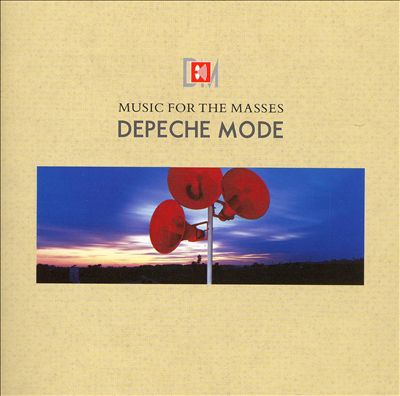
Music for the Masses
Depeche mode.
STREAM OR BUY:
Release Date
Recording date, recording location, discography timeline, allmusic review, user reviews, track listing, similar albums, moods and themes.
- Archives Home
- Return To Main Site
- Discography
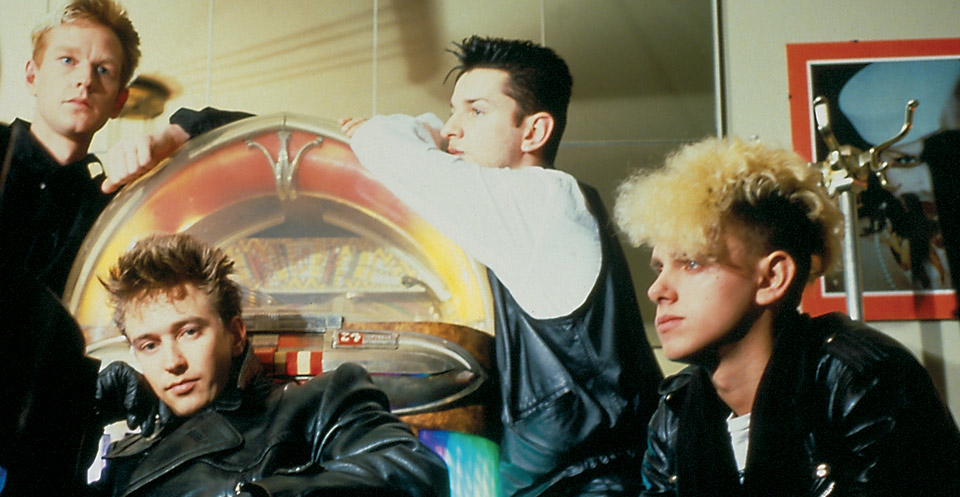
Music For The Masses Tour
Music For The Masses Tour - Europe 1987 Andy Fletcher, Dave Gahan, Martin Gore, Alan Wilder Opening Act(s): unknown-->
Music For The Masses Tour - USA & Canada 1987 Andy Fletcher, Dave Gahan, Martin Gore, Alan Wilder Opening Act(s): unknown-->
Music For The Masses Tour - UK 1988 Andy Fletcher, Dave Gahan, Martin Gore, Alan Wilder Opening Act(s): unknown-->
Music For The Masses Tour - Europe 1988 Andy Fletcher, Dave Gahan, Martin Gore, Alan Wilder Opening Act(s): unknown-->
Music For The Masses Tour - East Europe 1988 Andy Fletcher, Dave Gahan, Martin Gore, Alan Wilder Opening Act(s): unknown-->
Music For The Masses Tour - Japan 1988 Andy Fletcher, Dave Gahan, Martin Gore, Alan Wilder Opening Act(s): unknown-->
Music For The Masses Tour - USA & Canada 1988 Andy Fletcher, Dave Gahan, Martin Gore, Alan Wilder Opening Act(s): unknown-->
Visit a tour by clicking an icon below...
The request for ticket stubs has been halted temporarily, so we can catch up on the submissions. Thank you.
We are looking for ticket scans! Do you have a ticket to a show listed above that we don't have? Do you have a better quality image than what we already have? We welcome any ticket stub fan submissions to the site.
- PLEASE check before you scan and email your ticket stub that we don't already have the stub.
- One ticket scan per email
- 300 dpi JPEG scans of your ticket stubs (please do not submit JPEG files taken with a camera)
- Please include how you would like to be credited for your submission on the site (either a username, or your real name)
- Please do not submit images that you did not scan yourself
- Please allow some time before your submissions appear on the site.
Please note that submissions to the site might also be used (possibly without credit, but we will try to use proper credit when possible) from time to time on social media sites.

Archives Curator: Daniel Barassi
depeche mode dot com | facebook | twitter | instagram tumblr -->
Go back to the top of this page.
- Statistics Stats
- You are here:
- Depeche Mode
- Tour Statistics
- Song Statistics Stats
- Tour Statistics Stats
- Other Statistics
All Setlists
- All setlist songs ( 1503 )
Years on tour
- 2024 ( 32 )
- 2023 ( 89 )
- 2018 ( 53 )
- 2017 ( 89 )
- 2014 ( 25 )
- 2013 ( 90 )
- 2010 ( 24 )
- 2009 ( 83 )
- 2006 ( 99 )
- 2005 ( 26 )
- 2001 ( 87 )
- 1998 ( 65 )
- 1997 ( 7 )
- 1994 ( 60 )
- 1993 ( 99 )
- 1990 ( 91 )
- 1989 ( 3 )
- 1988 ( 72 )
- 1987 ( 34 )
- 1986 ( 78 )
- 1985 ( 30 )
- 1984 ( 63 )
- 1983 ( 56 )
- 1982 ( 77 )
- 1981 ( 49 )
- 1980 ( 22 )
Show all tours
- 1994 Summer North American Tour ( 33 )
- A Broken Frame Tour ( 48 )
- Black Celebration Tour ( 75 )
- Composition Of Sound Tour 1980 ( 6 )
- Construction Time Again Tour ( 49 )
- Depeche Mode UK Tour 1980 ( 18 )
- Devotional Tour ( 99 )
- Exciter Tour ( 85 )
- Exotic Tour ( 27 )
- Global Spirit Tour ( 131 )
- Memento Mori ( 112 )
- Music For The Masses Tour ( 101 )
- See You Tour ( 40 )
- Some Great Reward Tour ( 83 )
- Speak & Spell Tour ( 20 )
- The Delta Machine Tour ( 106 )
- 98"> The Singles Tour 86>98 ( 98"> 65 )
- Tour of the Universe ( 104 )
- Touring The Angel ( 122 )
- Ultra Parties ( 7 )
- World Violation Tour ( 89 )
- Avg Setlist
- Concert Map
Average setlist for tour: Music For The Masses Tour
- Song played from tape Pimpf Play Video
- Behind the Wheel Play Video
- Strangelove Play Video
- Sacred Play Video
- Something to Do Play Video
- Blasphemous Rumours Play Video
- Stripped Play Video
- Pipeline Play Video
- The Things You Said Play Video
- Black Celebration Play Video
- Shake the Disease Play Video
- Nothing Play Video
- Pleasure, Little Treasure Play Video
- People Are People Play Video
- A Question of Time Play Video
- Never Let Me Down Again Play Video
- Master and Servant Play Video
- A Question of Lust Play Video
- Everything Counts Play Video
Show Openers
Main set closers, show closers, encores played.
This feature is not that experimental anymore. Nevertheless, please give feedback if the results don't make any sense to you.
- Apr 24, 2024
- Apr 23, 2024
- Apr 22, 2024
- Apr 21, 2024
- Apr 20, 2024
- Apr 19, 2024
- FAQ | Help | About
- Terms of Service
- Ad Choices | Privacy Policy
- Feature requests
- Songtexte.com
"After a hefty drugs overdose, he died for two minutes, complete with a near death experience. Sure you want to be in a rock band?": The story of Depeche Mode's Songs of Faith and Devotion album and tour is the most rock 'n' roll ever
Near-death experiences, breakdowns, talking puppets, heart attacks, sleeping in coffins… Just another Depeche Mode album, then

Introduction
Wherever next, the recording - "it was going to be wonderful", the studio tech, post traumatic sofad disorder, the songs of faith and devotion – track by track.
Early Depeche Mode albums were made by a band that looked and sounded like clean-cut choir boys. But by the time they rolled around to album number eight, they'd become snarling electronic grungers with as many bad habits as they had death wishes.
And while their parents might have been worried, the resulting album was one of their finest, and the subsequent tour their most ridiculous. Welcome to the rock 'n' synth peak that was Songs of Faith and Devotion.
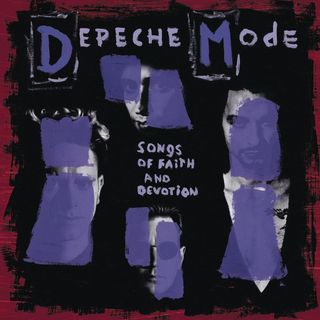
Songs of Faith and Devotion is widely regarded as Depeche Mode at their peak, but it's more of a twin peak, if we must be truly accurate.
SOFAD has an air of rock 'n' roll menace that makes it more Roskilde than Basildon, of that there is no doubt.
Previous album Violator is held in just as high esteem with DM fans, but is in many ways Devotion's opposite: a perfect, slick, song-crafted album where everything is in time and clean-shaven.
Songs of Faith and Devotion (SOFAD, if you'll excuse our already bruised fingertips) is Violator's wilder relation, with chunks of humanity slapped on the sequencers, slightly off-kilter synth-rock songs about human grubbiness, and an air of rock 'n' roll menace that makes it more Roskilde than Basildon, of that there is no doubt.
It's an album swaying about like a drunken cousin at Violator's wedding and, if not quite upstaging the host with its popular swagger, is certainly about to be told to stand outside and sober up for a bit. And have a bloody shave while it's at it.
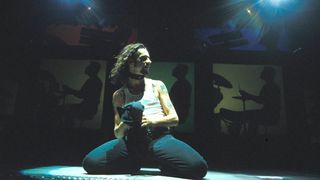
Whichever version of Depeche Mode is your peak, you can't deny the shadow Violator cast over subsequent Mode albums, especially so with SOFAD and its subsequent tour.
Get the MusicRadar Newsletter
Want all the hottest music and gear news, reviews, deals, features and more, direct to your inbox? Sign up here.
None of us came back with the idea that we were going to make Violator 2. Dave Gahan
Violator had taken the band to another level in terms of their success across the globe. Its World Violation tour saw them play to well over a million people by the end of the 1990s, with 50,000-seat stadiums packed out across the States alone.
After a couple of years off - probably just to get over the hangovers - the band reconvened for album number eight with everyone wondering how to follow the peak success of Violator.
And it would be the same team tackling the thorny issue. The elements were in place: Martin Gore's songwriting, Dave Gahan's singing, Alan Wilder's drumming, programming and co-production, and Andrew Fletcher's enthusiasm.
Luckily, the album had the all-important re-addition of Flood, aka Mark Ellis, who had also produced Violator. We say 'luckily' because Flood bought his famously short attention span to the SOFAD party. He doesn't like repeating the recording process with any album as he gets bored so easily, so was already guiding the band away from Violator for this recording.
Also luckily, Depeche were on board with that, and more than up for a change in direction. Gahan said at the time that “none of us came back with the idea that we were going to make Violator 2.”
Unluckily, this new path was about the only thing they all agreed on during the recording…
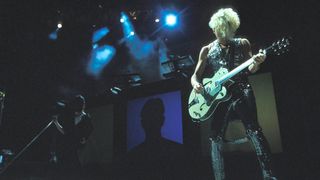
The recording of SOFAD started well. Martin had written some songs - again with the idea that they were going to go in a different direction.
You spend a year making a record, you might as well have fun while you do it. Martin Gore
"We'll just try to record them differently and make everything new and exciting," he said to Paul Morley on Channel 4 before the recording. "So we came over to Madrid. You spend a year making a record, you might as well have fun while you do it." Famous last words…
But armed with new songs, a producer with different ideas, and Alan especially chomping at the bit for new recording methods, the plan was that this Madrid studio would be the ideal place for the band to focus on their new direction.
'We Were Going to Live Together, Record Together and It Was Going to Be Wonderful' is the hilariously titled documentary on what happened next. The band had not seen each other for two years and were suddenly packed into a studio too far to walk anywhere just to blow off some steam. "Wonderful" it was not.
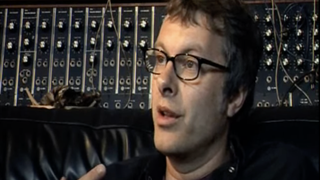
"It was just an incredibly hard record to make," is Flood's opening comment in the documentary, and you can tell from his eyes that even that is a massive understatement. He's rarely spoken about SOFAD since, such is the apparent PTSD.
I created a monster. Dave Gahan
The problems were caused not only by the studio location and pressure to follow up Violator, but also to explore all-new recording methods while they were at it, and all overshadowed by a lead singer's drug problems that had gone supernova since he'd last seen the band.
Gahan had also assumed an all-new rock star persona: long-haired, skinny, bearded and with an attitude to match, thanks to a new appreciation of US rock bands picked up during his time in LA.
"I created a monster," he told later told NME, and it would have to be this monster that Flood and Wilder would have to channel and join up with Gore's songs to create SOFAD.
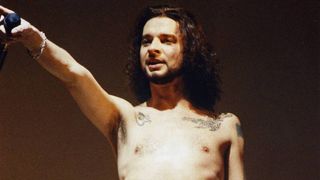
The problem with a rock direction for the Mode at this point was basic and quite simple: they weren't a rock band. With Wilder the only trained musician, there was no way they'd go into the studio and just play Gore's tunes.
We're not capable of going into a room, playing together, and coming up with some magical piece of music. Alan Wilder
"When we just go in and play together, we end up sounding like a pub rock band," Wilder told Sound On Sound/Keyboard Magazine in July 93 . "We're not capable of going into a room, playing together, and coming up with some magical piece of music."
But the solution was studio technology - certainly no stranger to the band - but used in a completely different way. With every album before SOFAD, Depeche Mode had used cutting-edge studio gear to create new sounds, whether that was synth for their pop, or the Emulators for their darker, industrial beats. With Songs of Faith and Devotion they effectively used the technology to sound human.
On tracks like Walking In My Shoes and I Feel You, the drums were played and recorded live, but then samples were taken, looped and sequenced in Cubase in a different order. Not a new thing by any means now, but it was for the Mode at the time.
Alan summed the differences between this approach and previous album Violator in the We Were Going To Live Together… documentary: "Violator is very programmed with lots of individual sampled sounds. But they are all programmed on the exact beat, whereas later [with SOFAD] we'd use big chunks of performance that would have all the inherent mistakes and humanity.
"For me the combination of using all of that modern technology with all of that character is what makes more interesting music."
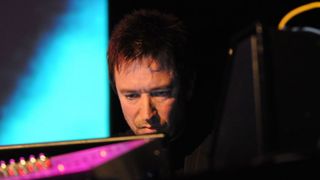
Despite the issues in the studio - understandably by this time, everyone was getting on everybody else's nerves - Wilder and Flood would piece the album together over long 12-hour sessions.
Our guitar parts tend to go quite weird. We run them through Leslies and other devices that make them less guitar-like. Alan Wilder
And while the sound was way more 'LA' than 'Essex circa 1981', there were a surprising number of synths used on SOFAD to back up all that sampling.
As Wilder explained to SOS/Keyboard : "We've still got the same selection of samplers - Akais and [Emu] Emulators. And lots of rackmounted and modular synths: a Minimoog, Oberheims, the Roland 700 system, ARP 2600s. There are fewer modern synthesizers than ever before - no DX7s, PPGs or things like that."
And even though rock was the new star, it was never going to be normal rock.
"We have a very strong aversion to typical rock guitar playing," Wilder added. "Our guitar parts tend to go quite weird. We run them through Leslies and other devices that make them less guitar-like while still keeping some of the power of the instrument."
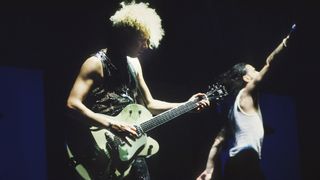
SOFAD came out in January 1993 and hit the top of the charts in 10 countries, including both the US and UK. It has currently sold four million units and remains one of Depeche Mode's most critically-acclaimed recordings.
This huge Bugs Bunny doll would become quite animated when I was out of my mind. Dave Gahan
But as successful as the album was, the signs were probably on that Madrid studio wall that the tour that resulted from those recording sessions would be anything but normal.
The Devotional tour that played across close to 100 dates in 1993 probably requires its own film one day. Call it 'Spinal Tap 3', if you like, but make it a proper documentary, not a comedy.
There have been stories, rumours, facts and fiction written about the tour: that the band drove in different limos and stayed at different hotels; that they had their own psychiatrist and spiritualist; that support bands came and went because they couldn't keep up; even that Dave slept in a coffin.
But what was undoubtedly true about the tour was the subsequent impact that it had on the band's health.
With his spiralling drug problems, Gahan ended up "living in a little apartment in Santa Monica and I had this huge Bugs Bunny doll [which] would become quite animated when I was out of my mind," he told ModeFan.com in 2005.
"I also had a Tin Man and a Lion. The Tin Man used to speak to me. It was basically psychotic behaviour, which of course now I can see. But at the time I thought, “Doesn’t everyone have these things?”
The fallout, both in the long and short term, was just as bad elsewhere.
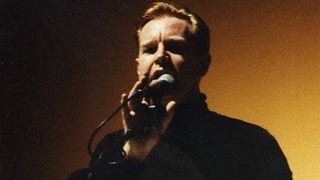
Fletch had a breakdown and at one stage left the tour, Gore had seizures and admitted his alcoholism, and Wilder was so affected he simply left the band.
After a hefty drugs overdose, he died for two minutes, complete with a near death experience. Sure you want to be in a rock band?
But leave it to Dave Gahan to top the lot, and nearly himself. He had an actual heart attack on stage, and later, after a hefty drugs overdose, died for two minutes, complete with a near death experience.
Sure you want to be in a successful rock band?
That any of the band even survived the 1990s is a miracle. That Depeche Mode are still making great records and touring 30 years on - they just finished a marathon set of dates for the excellent Memento Mori album - is simply insane.
So, despite the utter destruction that followed its recording, SOFAD's success played a big part in the band's longevity. With it, there was very nearly no Depeche Mode three decades ago. Yet without it, there would be no Depeche Mode today.
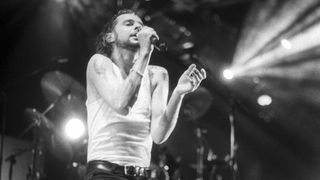
Let's take a look at the tracks on SOFAD with some commentary from Alan Wilder from his excellent Q&A section at recoli.co.uk .
The screeching tyre sound - actually a synth - that opens SOFAD on I Feel You is Dave and the band driving an XR2 Fiesta out of Basildon aiming for LA, squealing to a halt in front of you while Dave puts a cassette in, smiling as he knows you're going to be surprised by the album you're about to hear. You think, 'you really shouldn't be driving Dave', but give the album a listen anyway.
"Everyone else felt I Feel You should be first [as a single]," Alan Wilder says on Recoil . "The main reason for the choice was that the track had attitude and was radically different to what we had done before. We hoped it would surprise people and make them curious about the rest of the album."
It certainly did that…
Walking in My Shoes
According to Wilder, this second SOFAD single is one of the few Mode tracks that came together through jamming, with he and Martin playing bass and guitar respectively over a drum machine, after which he and Flood constructed the arrangement as he and we described earlier.
The result is a highlight track still played live to this day, while the accompanying video is all religion, naked women and moody black and white shots - standard DM fair, then. That said, the weird beaked creatures in the video that also appear on the live Devotional backdrop are cool, and we're pretty sure Dave had his eyes on them to go in his flat with his Bugs Bunny and Tin Man.
Condemnation
If by now you are in any doubt that SOFAD is a departure for the Mode - and you shouldn't be - then the gospel-laden Condemnation should seal the deal with its soul, heart, incredible vocal and not an ARP 2600 in sight.
I mean, whatever next? Country and western?
Mercy in You
Not one of Alan's top picks from SOFAD according to Recoil - "I don’t think it was particularly bad, it just wasn’t one of my favourites and took some time to complete" - but Mercy In You does have some fine elements: the backwards tracks, the chugging vocal, and the harmonies, plus the chorus is greater than the track four position promises. But yeah, it probably did take too long…
Judas is one of the most underrated tracks on one of the highest-rated DM albums, which should be enough, but we think it deserves even wider praise. Of all the tracks on SOFAD it might be less 'new direction' than old, but is still one of Martin's finer solo moments. Lovely strings, amazing vocals, a nice electronic sequence to close, and a superb atmosphere overall.
But not such a superb atmosphere during its recording according to Alan on Recoli : "I think Martin was quite attached to his demo version but I felt it needed more atmosphere. He in turn didn’t like the sequencer end section."
In Your Room
Here we go. You might not know it yet, but this is what you paid your entrance fee for. In Your Room is, quite simply, one of the top five Depeche Mode tracks of all time, partly because we said it was here , but mostly because it is 'everything Depeche Mode' in one track .
There's SOFAD DM, of course, there's incredibly moody DM, the subject matter is all sexy DM, and the arrangement is the perfect clash of electronics and rock. It really is the peak of SOFAD in that sense, so we're guessing you want some In Your Room facts, right?
According to Wilder on Recoil , the track employs a variphone which, depending on which corner of the internet you believe, is either an electronic wind instrument from Cologne or an early Soviet synthesizer.
In Your Room also uses a sound that Wilder calles ‘Splang’ which is "derived from a guitar. Each chord was sampled individually and then double-tracked with a second but different guitar sound. There is also a string/choir pad (another backwards sound) playing the same chords in the background."
Get Right with Me
If you were the song Get Right with Me, you'd be annoyed at having to follow In Your Room, and in some ways the track does suffer from its 'follow that' position. It's probably the most straight up rock/blues/gospel track on SOFAD – any DM album, in fact – and it fulfils its brief in less than three minutes.
But hang on, what's this? After Get Right With Me, DM insert one of their mini electronic tracks they used to include on earlier albums. These ditties often appeared as 'hidden' tracks, and while this is hardly hidden, it's a neat nod back to synthier times after the most acoustic of SOFAD tracks.
' Rush has to be about drugs, right?' someone rather forthrightly asks Alan at his Q&A on SOFAD at Recoil . To which he elegantly sidesteps by replying: "I always personally preferred to interpret his [Martin's] songs in exactly the same way as the audience might, using one’s own imagination and consequently giving them one’s own personal meaning."
What Rush is though is one of SOFAD's highlights; a blistering wakeup call where synths sound like guitars and vice-versa and where Dave sings 'when I come up, I rush for you' like he really ruddy well means it. It's about drugs then, isn't it?
Just when you think you've got your head around SOFAD – it's DM with real drums and guitars and long hair, right? – along comes One Caress, all string quartets and Martin probably wearing some kind of powdered wig as he saunters through his 16th-century ballroom, singing one of his best ever songs and swinging a cane.
By this point, if the band closed SOFAD with a 1940s jazz number number in 13/4 time you wouldn't be surprised. Fortunately, it's a lot better than even that.
Higher Love
Where many bands might finish off an album with a throwaway track - "just stick that on the end, no-one will notice" - Depeche Mode have always gone out on a high. From Just Can't Get Enough on their debut album, for example, to Clean on Violator. Need we say more?
Higher Love is right up there with In Your Room on SOFAD according to these ears, and springs to life from its swirling production into a rock synth classic. So good, in fact, that U2 might have even lifted the drums to use in their track So Cruel on Achtung Baby . Well, not U2 , per se: "Didn’t Flood work on both LPs?" Alan enquires on Recoil.
Anyway, it's damn near perfect ending to a damn near perfect DM album that has everything from rock to classical and blues to sequences. As Bugs Bunny might say, 'That's all folks'.

Andy has been writing about music production and technology for 30 years having started out on Music Technology magazine back in 1992. He has edited the magazines Future Music, Keyboard Review, MusicTech and Computer Music, which he helped launch back in 1998. He owns way too many synthesizers.

No longer just a software upgrade, Roland’s Fantom EX is a “supercharged” version of the acclaimed synth workstation
Kartell: "The piece of gear that I use the most? The Behringer Poly D. For such a low price, the sound and capabilities still surprise me"
Music theory you can use: How to create a chord progression from any melody
Most Popular

IMAGES
VIDEO
COMMENTS
Music for the Masses is the sixth studio album by the English electronic music band Depeche Mode, released on 28 September 1987 by Mute Records. The album was supported by the Music for the Masses Tour, which launched their fame in the US when they performed at the Rose Bowl in Pasadena, California.The tour led to the creation and filming of the documentary/live album titled 101.
Depeche Mode 'Music For The Masses Tour' 1987 - 1988. Name tour: Music For The Masses Tour. Tour dates: Start: 22 October 1987 / End: 18 June 1988. Total executed: 24 songs. Total show:
The Music for the Masses Tour was a concert tour by Depeche Mode in 1987 and 1988. The tour was the eighth tour by Depeche Mode and followed the release of their sixth studio album Music for the Masses. The band toured through the U.K., Europe, Japan and North America. The tour began on October 22, 1987 with a concert in Madrid, and ended on June 18, 1988 with concert No. 101 at the Rose Bowl ...
Notes. Depeche Mode's famous 101st and final concert of the 1987-1988 Music For The Masses Tour at the Rose Bowl in Pasadena. A documentary and double live album, 101, was released of the concert.In the documentary, Jonathan Kessler can be heard saying that with this concert they sold 66,233 tickets and the paid attendance was 60,453 people, and they grossed $1,360,192.50.
Music for the Masses is the sixth studio album by English electronic music band Depeche Mode. It was released on 28 September 1987 by Mute Records, and was supported by the Music for the Masses Tour.
Caught between the two, and sharing the light with 101, Music For The Masses isn't a small album, nor is it a weak one. From an increasing distance, though, it feels underrated - which may be a surprise to anyone in the crowd shown in 101, listening to Los Angeles's powerhouse station KROQ spinning songs from it constantly, attending that Rose Bowl show.
Music for the Masses is the sixth studio album by English electronic music band Depeche Mode, released on September 28, 1987 by Mute Records. The album was supported by the Music for the Masses Tour. Daniel Miller, who had co-produced Depeche Mode's previous album, voluntarily stepped away from production duties for this album, citing the growing tension in the studio that they had experienced ...
Depeche Mode - 'Music For The Masses' (Sire/Mute - 1987) Buy the 12" Singles Box Sets - https://depechemodeboxsets.com Listen to more Depeche Mode - https://...
For Depeche Mode, a band that was perhaps best known for their 1981 boppy-electro hit "Just Can't Get Enough," this tipping point occurred with the deliberately ironically titled Music For The Masses, released in September 1987. Die-hard Depeche Mode fans knew that the band had evolved in leaps and bounds since the bouncy new wave days of ...
Depeche Mode. Landing in between the pensive darkness of Black Celebration and the wide-open vistas of Violator, 1987's Music for the Masses finds Depeche Mode retooling synth-pop for a bigger stage. Seductive and slightly dangerous, the electro-driven "Behind the Wheel" is a masterpiece of the car-pop canon; "The Things You Said" and ...
Mixed Pickles. Orchestral Manoeuvres in the Dark. Thomas Dolby And The Lost Toy People. Wire. Length. 1987-10-22 - 1988-06-18 (7 months, 27 days) Number of shows. 101. The Music For The Masses Tour was a 1987-1988 international tour undertaken by Depeche Mode in support of their sixth studio album Music For The Masses .
Depeche Mode - 101 A Concert For The Masses Live at The Rose Bowl, Pasadena (HD)Setlist:0:00:00 Pimpf0:02:25 Behind The Wheel0:07:14 Strangelove0:11:08 Sacre...
101 is a live album and documentary film by English electronic music band Depeche Mode, released on 13 March 1989 by Mute Records.It chronicles the final leg of the band's Music for the Masses Tour and the final show on 18 June 1988 at the Rose Bowl in Pasadena, California.. Band member Alan Wilder is credited with coming up with the album's title; the performance was the 101st and final ...
Music for the Masses is the sixth studio album by the English electronic music band Depeche Mode, released on 28 September 1987 by Mute Records. The album was supported by the Music for the Masses Tour, which launched their fame in the US when they performed at the Rose Bowl in Pasadena, California. The tour led to the creation and filming of the documentary/live album titled 101.
Music for the Masses by Depeche Mode released in 1987. Find album reviews, track lists, credits, awards and more at AllMusic. ... Music for the Masses (1987) Violator (1990) Songs of Faith and Devotion (1993) Ultra (1997) Exciter (2001) Playing the Angel (2005) Sounds of the Universe (2009)
The archives of Depeche Mode. From Dreaming Of Me to Heaven. From Speak And Spell to Spirit, and beyond. Archives Home | Return To Main Site; Audio; Discography; Images; Lyrics; Past Tours; ... Music For The Masses Tour - USA & Canada 1988 Andy Fletcher, Dave Gahan, Martin Gore, Alan Wilder. April 29th, 1988. Shoreline Amphitheatre ...
Share your videos with friends, family, and the world
For the Masses is a 1998 tribute album to the British band Depeche Mode, specifically the works of Martin Gore.The album charted in America and reached the Top 20 in Germany, making it the most successful Depeche Mode tribute album of all time. The album title is taken from Depeche Mode's 1987 album Music for the Masses. The album cover was photographed by Martyn Atkins who shot and designed ...
Encores Played. 1. 2 Encores. 101. This feature is not that experimental anymore. Nevertheless, please give feedback if the results don't make any sense to you. View average setlists, openers, closers and encores of Depeche Mode for the tour Music For The Masses Tour!
Depeche Mode. Landing in between the pensive darkness of Black Celebration and the wide-open vistas of Violator, 1987's Music for the Masses finds Depeche Mode retooling synth-pop for a bigger stage. Seductive and slightly dangerous, the electro-driven "Behind the Wheel" is a masterpiece of the car-pop canon; "The Things You Said" and ...
No credit card needed. Listen to Music for the Masses (Deluxe) on Spotify. Depeche Mode · Album · 1987 · 18 songs.
Not much to say on this one, great sounding album to being with, let's see what it sounds like when you master it with modern tools, shall we?I will say that...
Whichever version of Depeche Mode is your peak, you can't deny the shadow Violator cast over subsequent Mode albums, especially so with SOFAD and its subsequent tour. Get the MusicRadar Newsletter Want all the hottest music and gear news, reviews, deals, features and more, direct to your inbox?
Buy Depeche Mode - Music For The Masses & Black Celebration - Mute - Cass, Comp - C STUMM 47, includes Never Let Me Down Again, The Things You Said, Strangelove, Sacred, Little 15, Behind The Wheel, I Want You Now, To Have And To Hold, Nothing, Pimpf, Black Celebration, Fly On The Windscreen - Final, A Question Of Lust, Sometimes, It Doesn't Matter Two, A Question Of Time, Stripped, Here Is ...
The Memento Mori World Tour was a worldwide concert tour by English electronic music band Depeche Mode in support of the group's 15th studio album, Memento Mori.The tour began on 23 March 2023 and concluded on 8 April 2024. This marked the first concert tour to not feature keyboardist Andy Fletcher, who died in 2022.. The tour was first announced on 4 October 2022, along with the Memento Mori ...
About Press Copyright Contact us Creators Advertise Developers Terms Privacy Policy & Safety How YouTube works Test new features NFL Sunday Ticket Press Copyright ...
Сегодня у нас потрясающий альбом от Depeche Mode - работа 1987 года и их шестой релиз. Это одно из лучших ...